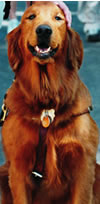McClure is a four-year-old golden retriever with a daunting job description. It requires him to ignore squirrels and walk by old pizza crusts.
McClure trained at The Seeing Eye in Morristown, N.J., the original guide-dog school that first began providing Seeing Eye dogs to the blind in 1929. Funded by charitable donations, The Seeing Eye matches carefully trained guide dogs with blind people in the U.S. and Canada. It raises the dogs (mainly German shepherds and retrievers) and trains them. It then offers them to the blind, along with four weeks of training, for $150 US – a fee unchanged since 1934.
McClure spent a year with a foster family learning basic obedience and being exposed to people, busy streets and subways. He then spent four months at the Seeing Eye campus learning basic working commands. About the same time, The Seeing Eye was evaluating Michelle McQuigge’s application to join the guide-dog program. Applicants need independent travel skills, good hearing, and the discipline and maturity to care for their dog.
Once accepted, McQuigge journeyed to Morristown to be matched with a dog. There trainers evaluated her strength and walking pace to determine the best fit. They also took into account her voice, temperament and home environment before teaming her with McClure for training. They learned to manoeuvre on streets, on escalators and in restaurants, finishing with a field trip to New York City.
McQuigge says McClure may not be the brightest of dogs, but he has proven focused and devoted. Her mother, Helene, says she’d trust him with Michelle’s life. McClure’s working commands are few: forward, left, right, hup-up (“let’s go”) and phooey (“bad dog”). But he is also trained to assess situations himself. He will ignore a command when he thinks it would lead to danger – say, walking into heavy traffic – in a behaviour called “intelligent disobedience.”
At home, McClure follows McQuigge from room to room with a watchful gaze. But once his harness is removed he turns cuddly and affectionate, nuzzling people for a head rub or a friendly pat. Even trained professionals need a break.





